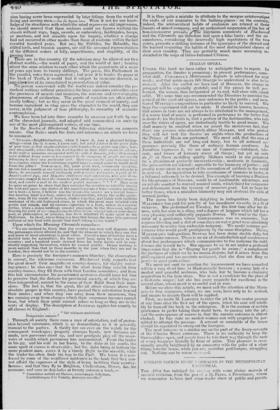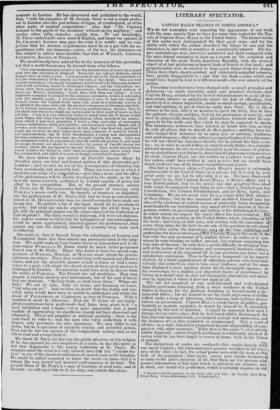ENGLISH SACRED MUSIC :riSGRACED IN THE METROPOLITAN
CAT: EDRAL.
THE Atlas has indulged its reaaers with some choice morsels of musical criticism, from the pen of a M. YETIS, a Frenchman, whom we remember to have met sonic weeks since at public and private concerts in London. He has discovered and published to the world, that, " with the exception of M. JOUSSE, there is not a single profes- sor in London who has just notions of fugue, of counterpoint, or of the other parts of musical composition ;" also, that " Dr. CROTCH lectures to the pupils of the Academy without saying anything ;" and sundry other pithy remarks, equally true. To our knowledge, M. FETIS understands not a word of English, and hence his opinion of Dr. CaoTcH's lectures may pass for what it is worth : and we con- jecture that his musical acquirements must be on a par with his ac- quaintance with our language,—since, of the two, his ignorance on this subject is rather more credible than that of WESLEY, CROTCH, CLEMENT!, ADAMS, OT NOVELLO.
We should hardly have noticed the frothy nonsense of this pretender, but that a useful lesson may be learned from what follows.
" Few circumstances give occasion for the introduction of music on a grand scale into the churches of England. These few are solemn festivals, which happen once or twice a year. I was present at one in St. Paul's cathedral—it was the anniversary of the charity for the sons of the clergy. • This is a very ancient institution ; for nearly a hundred years Purcell's Te Deum and Jubilate, with a full orchestra, Handel's Hallelujah Chorus, and the Coronation An. them, have been performed at its anniversary, besides a grand anthem of Boyn (qY. Boyce), beginning, Lord, thou hast been our refuge.' A very numerous company is present at this religious ceremony, which is celebrated with the utmost pomp. I was very anxious, I own, to hear the music of Purcell, whom the English dwell upon with pride as a musician worthy to be placed in the same rank with the greatest composers of Germany and Italy. As to French composers, they do not even mention them, because they do not think that there is a single one comparable to their giant of music as they call him. I was in a very admirinz frame of mind when the Te Deum of this giant began, but what was my disappointment, when, instead of the master- piece which I had been promised, I heard a long succession of unmeaning phrases, modulations badly put together, and harmonies which, though full of pretence, were incorrect. I imagined, at first, that I was deceived, and that I ought not to trust my first impressions upon a species of music to which I was unaccustomed ; but M. Felix Mendelssohn, a young and distinguished German composer, who 'was near me, thought exactly the same. Such was the uneasiness which he experienced, that he would not prolong it, and made his escape, leaving me alone to encounter the genius of Purcell during the Jubilate, which did not appear to me any better. They would almost stone you at London for daring to utter such an opinion upon pieces which time has consecrated, and which it is now no longer permitted to examine."
We have before (in our review of Purcell' s Sacred Music by Novell()) given our brief and honest opinion of this disgraceful per- formance; and we now see one of the consequences of tolerating any thing so radically and incurably bad. There are two ways in which a musician can judge of a conaposition,—give him a score, and the effect of the performance will be Clearly developed to his mind; or let him hear the music correctly performed by a band capable of giving full effect to the composition. But, in the present instance, neither M. FETIS nor M. MENDELSSOHN had any chance of knowing what PURCELL'S music really was. So meagre, so incorrect, so disjointed, was the performance at St. Paul's, that had we been as conveniently placed as M. MENDELSSOHN was, we should assuredly have made our escape too. To publish 'a list of the band, would be to proclaim its poverty : but what else can be expected where the whole thing is a job, and the principal singers are the vicars choral of the Cathedral or their deputies ? The thing would be ludicrous, if it were not disgrace- ful; and we venture to think that the indignation of our contemporary would be more appropriately directed against the performance, than against any one for relieving himself by running away from such an infliction.
The truth is, that of Sacred Music the inhabitants of London and Westminster know less than almost any provincial town in the king- dom. We could name at lcast twenty towns in Lancashire and York- shire where PURCELL'S Te Deum would be much better performed than it was at St. Paul's. Those who desire to hear the sacred com- positions of HANDEL, MOZART, or HAYDN, MIA attend the provin- cial music meetings. There they would hear well-trained and effective choirs, and not the miserable muster of half a dozen or half a score voices to a part, with which the choral music of these great masters is burlesqued in London. No musician could turn away in disgust from the works of PURCELL. The French are not musicians. They may
acquire a certain mastery over instruments, but of the soul of music they are destitute. "By their fruits ye shall know them." Where are they ? We ask in vain. Italy we know, and Germany we know, "but who are ye ?" And we have no doubt that this frothy and con- ceited critic would have been as unable to understand and relish the
music of PALESTRINA OT CARISSIMI as that of PURCELL. With a musician it must be otherwise. Had the Te Deum of our highly- gifted countryman been performed—had there been given to it "a local habitation and a name,"—it is quite impossible that a mind
capable of appreciating its excellence should not have discerned and admired it. This is not prejudice or national partiality : there is the work itself to refer to ; and the man who turns aside from it with
disgust, only proclaims his own ignorance. We may differ in our tastes, but as a specimen of masterly writing and powerful genius, there can be but one opinion of this composition among such as are able to read and comprehend it.
We thank M. FHTIS for drawing the public attention to this subject. If he has exposed his own emptiness as a critic, he has also made us
feel how disgraceful is this yearly exhibition at St. Paul's. He imagines (and the error is a very natural one) that this "solemn fes- tival" is one of the grandest exhibitions of sacred music in the kingdom. He would be rather surprised to know the truth—to know that it is among the very lowest and meanest performances of its kind. The present Dean of St. Paul's is a man of learning, of good taste, and of decision: we call upon him to do his duty, and reform this abuse.



















 Previous page
Previous page